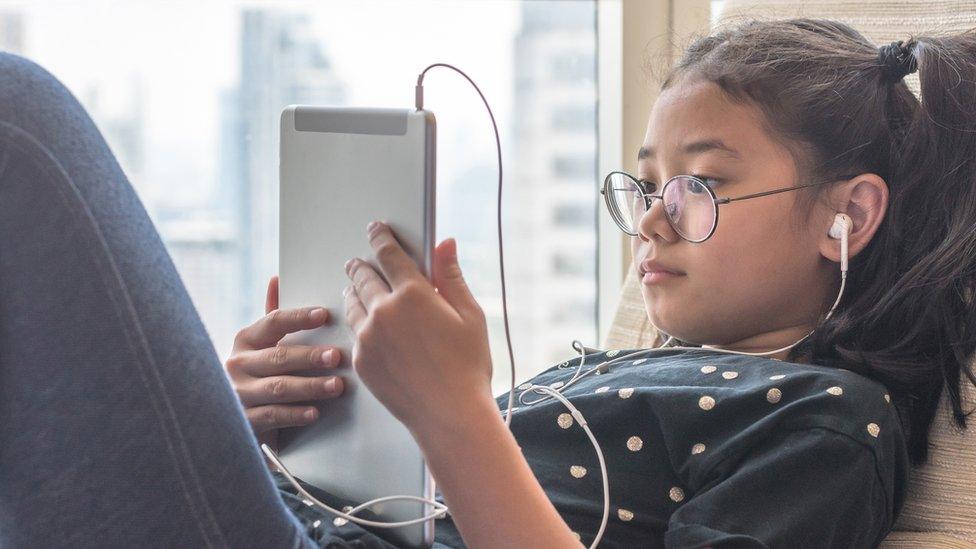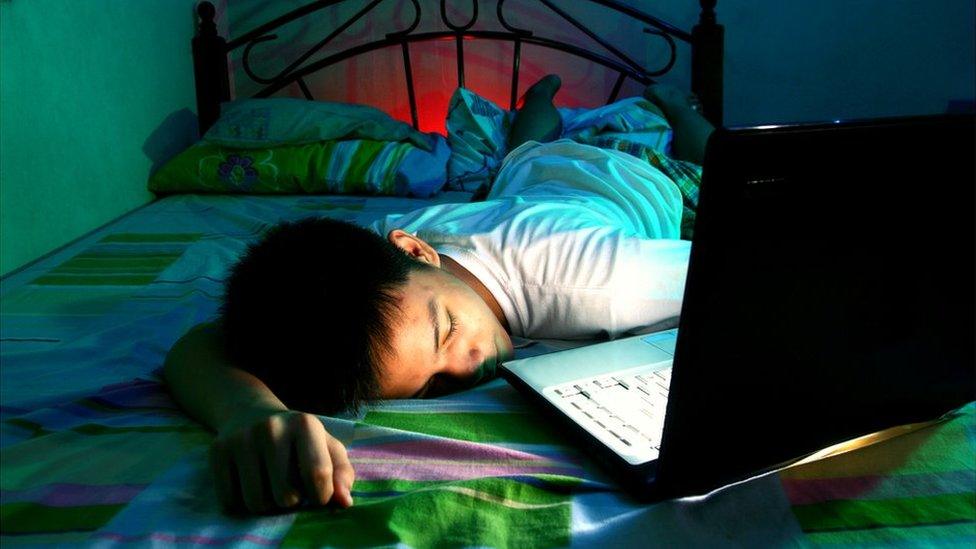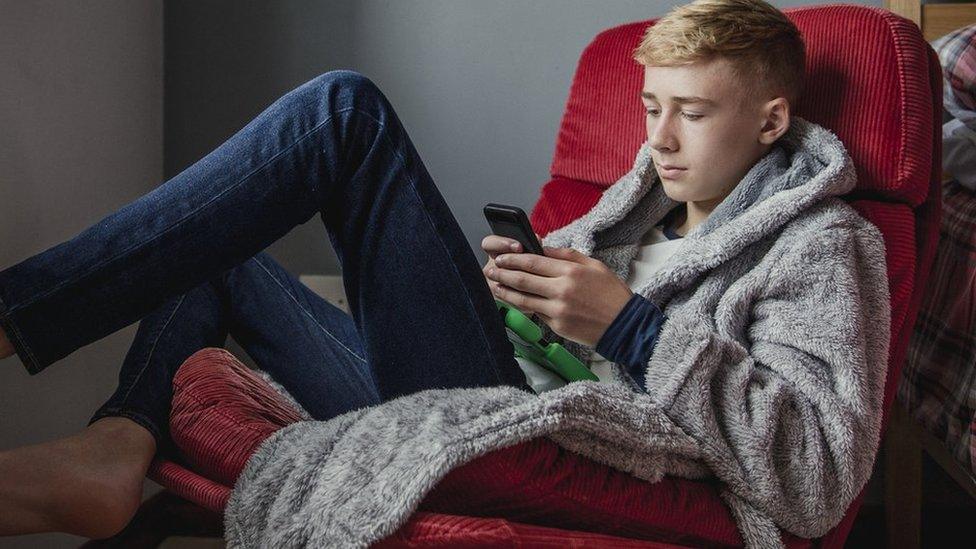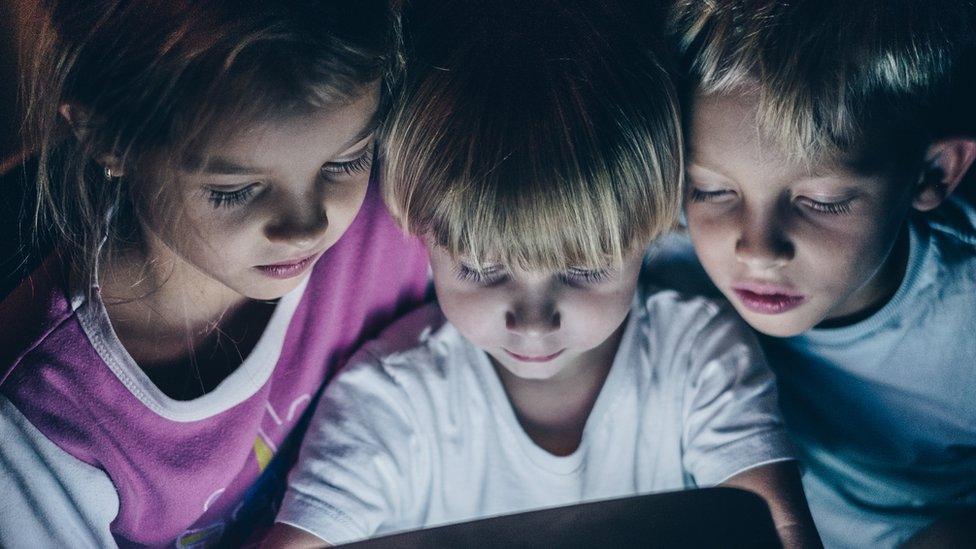Tips on how to limit excessive screen time
- Published

Is your family's screen use out of control?
New guidance from the Royal College of Paediatrics and Child Health (RCPCH) has stopped short of recommending specific limits on screen time, saying there is little evidence that it is harmful. But some parents have told the BBC they are frustrated by the advice and England's children's commissioner has said parents need more support.
Andy, whose son is 14, contacted the BBC to say he was disappointed by the advice.
"There is absolutely no doubt in my mind that screen time is damaging school performance and sports performance and dangerously addictive.
"I have had to restrict my son's screen time to a Friday after school and a Saturday, due to lack of focus at school. His default was to head straight to the Xbox (which I would certainly classify as screen time... it is just a game after all which most boys are engaging in across all devices).
"After some grumbling, he has settled in and we have seen an improvement in school performance.
"I coach the under-15 football team and it is very clear, even with a 14:00 kick-off on a Sunday, who has been up all night on some form of screen."
Anne Longfield, the children's commissioner, believes guidance is sorely needed by parents.
"The fact that there isn't enough evidence doesn't mean we shouldn't have a view and try to work out what's best to do. Children are getting screens earlier, the average age to get a smartphone is now nine. Parents tell me that it is the one thing that drives them mad, causes huge rows, and they don't know what to do about it.
"Parents are worried their kids will be socially damaged if they don't give them a phone, so they're in a tough spot."

Screen time can disrupt sleep
Is your family's screen time out of control?
The RCPCH said there was no good evidence yet that time in front of a screen is definitely "toxic" to health, although they did publish a list of questions families can ask to assess whether screen use is affecting their children negatively.
The questions are:
Is your family's screen time under control?
Does screen use interfere with what your family want to do?
Does screen use interfere with sleep?
Are you able to control snacking during screen time?
So if parents feel like screen time is having an adverse impact on their children's life, what should they do?
Set boundaries
Last year, Anne Longfield published the Digital 5 A Day campaign, which encouraged the whole family to have a healthy digital lifestyle, including parents.
"It can't be that parents have their phones in their hand the whole time. It works best if the whole family can look into a healthy digital way of life."
Anne Longfield's tips for managing screen time include:
Set some boundaries. You wouldn't let a nine-year-old walk alone down a busy road. Phone use is the same, if a child has a smartphone at a young age you need to be aware of the dangers on their behalf.
If screen time is affecting sleep, meal time interaction, diet, and exercise then negotiate and make a deal. This might be that the phone is not used at the dinner table or in the bedroom, or before breakfast, or until homework is completed.
Consider your own use, parents need to demonstrate good behaviour.
Ms Longfield is now calling on the government to put digital emotional resilience into schools in Years 6 and 7. She is also calling for tech companies to be more "robust and have a duty of care for their users".
Prioritise sleep
Dr Richard Graham is a child and adolescent psychiatrist. In 2010, he launched the UK's first Technology Addiction Service for young people, and is on the board of the UK Council for Child Internet Safety.
He recommends that clients adopt the American Academy of Pediatrics family media plan, external, which allows a family to set limits together.
"This plan helps a family to look at the sort of media you are going to access, rather than restriction without explanation.
"There is good stuff online, which can make us feel well and healthy. A funny filter on Snapchat for example, can lift a child's mood. But there is also toxic content, and also the fact that screen time can disrupt important and necessary things like sleep, exercise and conversation."
His tips include:
Prioritise sleep. A well-rested child is more in control and able to think and discuss than a tired and irritable one. The American Academy of Pediatrics website offers a guide to the length of sleep your child needs for their age. Calculate their bedtime based on when they have to get up.
Be wary about surveillance as it can drive behaviour underground. It's important children feel they can talk about issues.
Less time online equals less exposure to the possibility of toxic content. Says Dr Graham: "It makes sense that if the window is not open so wide, less dirt will fly in."
'A focus on appearance can lead to unhappiness'
Dr Tara Porter, a clinical psychologist specialising in child and adolescent mental health, says she is concerned about screen use as a clinician and a parent.
"Girls are being sucked into drama at a younger age, things said face-to-face are often less hurtful than things said in the online echo chamber, which can be escalated," she says.
"A focus on the best appearance can also lead to dissatisfaction and unhappiness."
Her tips include:
Supervise the device until they are 16 years old. Make it a condition of them having the device that you help them use it sensibly.
Use parental control apps like Our Pact and Circle to limit access to devices.
Stay on the front foot - before you give them a device, set out a contract of use
Use tech to limit screen time
Concerned parents have a bewildering array of options to choose from when seeking to manage how much time their children spend on screens.
Some home routers and security packages allow parents to set time limits for devices and monitor and police what can be seen online. Some can be used to impose time limits but these can be very blunt tools.
Most game consoles and computers include tools that can restrict how long the particular gadget is used for.
Finally, there are apps and other tools from Apple, Google, Facebook and others that can monitor how much time is spent on various programmes. Some let parents set hard limits so net access, apps or machines are locked at specific times.
A non-profit organisation Child Net, external has a guide that gives advice and links for concerned parents.

- Published4 January 2019

- Published4 January 2019
